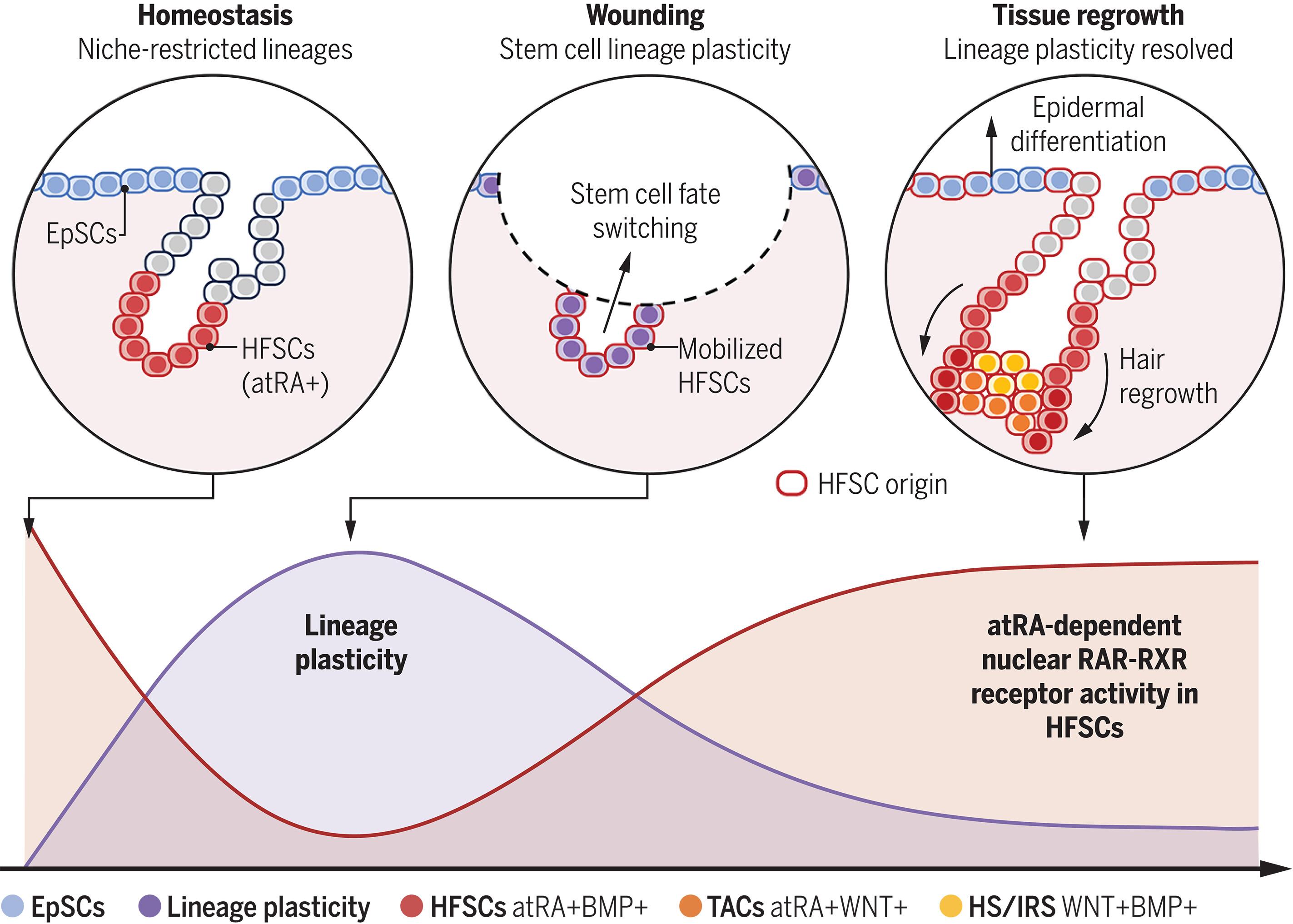Vitamin A resolves lineage plasticity to orchestrate stem cell lineage choices
IF 44.7
1区 综合性期刊
Q1 MULTIDISCIPLINARY SCIENCES
引用次数: 0
Abstract
Lineage plasticity—a state of dual fate expression—is required to release stem cells from their niche constraints and redirect them to tissue compartments where they are most needed. In this work, we found that without resolving lineage plasticity, skin stem cells cannot effectively generate each lineage in vitro nor regrow hair and repair wounded epidermis in vivo. A small-molecule screen unearthed retinoic acid as a critical regulator. Combining high-throughput approaches, cell culture, and in vivo mouse genetics, we dissected its roles in tissue regeneration. We found that retinoic acid is made locally in hair follicle stem cell niches, where its levels determine identity and usage. Our findings have therapeutic implications for hair growth as well as chronic wounds and cancers, where lineage plasticity is unresolved.

维生素 A 解决了干细胞系的可塑性,从而协调了干细胞系的选择。
系谱可塑性--一种双重命运表达状态--是将干细胞从其生态位限制中释放出来,并将其重新定向到最需要它们的组织区划所必需的。在这项工作中,我们发现,如果不解决系的可塑性,皮肤干细胞就不能在体外有效地生成每一个系,也不能在体内再生毛发和修复受伤的表皮。通过小分子筛选,我们发现视黄酸是一个关键的调节因子。结合高通量方法、细胞培养和体内小鼠遗传学,我们剖析了维甲酸在组织再生中的作用。我们发现,视黄酸是在毛囊干细胞龛中局部制造的,其含量决定了毛囊干细胞的特性和用途。我们的发现对毛发生长、慢性伤口和癌症都有治疗意义,因为这些疾病的细胞系可塑性尚未解决。
本文章由计算机程序翻译,如有差异,请以英文原文为准。
求助全文
约1分钟内获得全文
求助全文
来源期刊

Science
综合性期刊-综合性期刊
CiteScore
61.10
自引率
0.90%
发文量
0
审稿时长
2.1 months
期刊介绍:
Science is a leading outlet for scientific news, commentary, and cutting-edge research. Through its print and online incarnations, Science reaches an estimated worldwide readership of more than one million. Science’s authorship is global too, and its articles consistently rank among the world's most cited research.
Science serves as a forum for discussion of important issues related to the advancement of science by publishing material on which a consensus has been reached as well as including the presentation of minority or conflicting points of view. Accordingly, all articles published in Science—including editorials, news and comment, and book reviews—are signed and reflect the individual views of the authors and not official points of view adopted by AAAS or the institutions with which the authors are affiliated.
Science seeks to publish those papers that are most influential in their fields or across fields and that will significantly advance scientific understanding. Selected papers should present novel and broadly important data, syntheses, or concepts. They should merit recognition by the wider scientific community and general public provided by publication in Science, beyond that provided by specialty journals. Science welcomes submissions from all fields of science and from any source. The editors are committed to the prompt evaluation and publication of submitted papers while upholding high standards that support reproducibility of published research. Science is published weekly; selected papers are published online ahead of print.
 求助内容:
求助内容: 应助结果提醒方式:
应助结果提醒方式:


